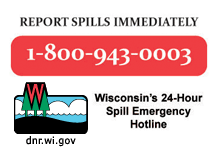Manure spills response, planning and prevention
Report manure spills immediately!
Call our 24-hour spill emergency hotline: 1-800-943-0003.
All agricultural or livestock operations, regardless of size, must report manure spills or runoff that may affect Wisconsin's waters to the Department of Natural Resources.
Response planning for spills
- Know whom to call and steps to take.
Think about, and write down, who you'll call and the steps you'll take, if a spill occurs. Your goal should be manure containment and damage minimization. Develop a plan and make sure you have needed supplies on hand. Example plans: - Get a Nutrient Management Plan in place for next year.
Nutrient management planning helps guide where and when you'll spread manure. Having a plan helps decrease fertilizer costs, maximize productivity and reduce the risk of runoff into streams or drinking water. Nutrient management planning resources:
Prevention of spills
Preventing manure spills is possible! Careful management of manure maximizes its fertilizer value. Improperly spread manure may carry into lakes, rivers and groundwater. Rain or melting snow increases this risk. Prevent manure spills and runoff by taking the following steps:
- Check the Runoff Risk Advisory Forecast (RAFF) [exit DNR].
Wisconsin's Manure Management Advisory System includes maps that show the day-to-day risk of runoff occurring across Wisconsin. The forecast uses National Weather Service methods that consider precipitation, soil moisture, and individual basin characteristics. - Follow winter spreading restrictions [PDF].
Even if you are not a Concentrated Animal Feeding Operations (CAFO), following their winter spreading restrictions is a good idea. During February and March, CAFO WPDES permits prohibit surface applications of liquid and solid manure on frozen or snow-covered ground. - Check options with county land conservation agents, certified agronomists or manure haulers for manure pit emptying. They can help identify alternatives to spreading. Alternatives may include stacking the manure away from fields near lakes or rivers.
- Find alternatives to spreading.
Select areas where location or slope decreases the possibility of manure runoff. Avoid areas near drinking water wells or areas with sinkholes or exposed bedrock. County land conservation agents can help you select low risk areas.

